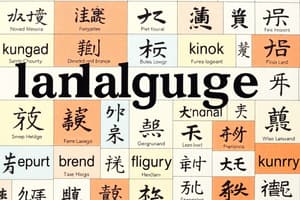Podcast
Questions and Answers
What type of verbs are used to describe states?
What type of verbs are used to describe states?
- Stative verbs (correct)
- Intransitive verbs
- Dynamic verbs
- Transitive verbs
What does the perfect tense connect?
What does the perfect tense connect?
- A present action to the past
- A past action to the present (correct)
- A future action to the present
- A completed action to another completed action
Stative verbs provide information about the internal structure of the state.
Stative verbs provide information about the internal structure of the state.
False (B)
The perfect tense can be formed by adding 'will' in front of the past participle.
The perfect tense can be formed by adding 'will' in front of the past participle.
What is a morpheme?
What is a morpheme?
What is an example of a sentence using the present perfect tense?
What is an example of a sentence using the present perfect tense?
The term __________ is known as pluperfect.
The term __________ is known as pluperfect.
The verb 'love' is considered a _______ verb.
The verb 'love' is considered a _______ verb.
Match the situation types with their examples:
Match the situation types with their examples:
Match the following examples with their corresponding tense:
Match the following examples with their corresponding tense:
Which of the following words is an example of a morpheme?
Which of the following words is an example of a morpheme?
Words must be listed in the lexicon to be part of a language's vocabulary.
Words must be listed in the lexicon to be part of a language's vocabulary.
What are the parts of the morpheme in 'reconsideration'?
What are the parts of the morpheme in 'reconsideration'?
Which of the following demonstrates the consonant devoicing rule?
Which of the following demonstrates the consonant devoicing rule?
Agglutinative languages have a low ratio of morphemes to words.
Agglutinative languages have a low ratio of morphemes to words.
What type of languages are characterized by a high ratio of morphemes to words?
What type of languages are characterized by a high ratio of morphemes to words?
In the context of phonology and morphology, elements combine at the __________ level.
In the context of phonology and morphology, elements combine at the __________ level.
Match the following terms with their descriptions:
Match the following terms with their descriptions:
What is an example of irregular forms in the lexicon?
What is an example of irregular forms in the lexicon?
The lexicon includes complex grammatical rules.
The lexicon includes complex grammatical rules.
What is a challenge for a morpheme-based approach in language?
What is a challenge for a morpheme-based approach in language?
What does Joan Bybee suggest about the emergence of the lexicon?
What does Joan Bybee suggest about the emergence of the lexicon?
Infants are unable to infer word boundaries after being exposed to an artificial language for just two minutes.
Infants are unable to infer word boundaries after being exposed to an artificial language for just two minutes.
What phenomenon demonstrates the power of visual memory according to Standing (1973)?
What phenomenon demonstrates the power of visual memory according to Standing (1973)?
Joan Bybee’s argument suggests that the lexicon is emergent from the storage of __________ experiences.
Joan Bybee’s argument suggests that the lexicon is emergent from the storage of __________ experiences.
Match the following terms with their definitions:
Match the following terms with their definitions:
Which of the following is an example of analogy in language learning?
Which of the following is an example of analogy in language learning?
Long-term recall of linguistic details is not possible according to the research presented.
Long-term recall of linguistic details is not possible according to the research presented.
What capability do humans possess regarding the recall of voices, words, and sentences?
What capability do humans possess regarding the recall of voices, words, and sentences?
In the sentence 'He sliced me a large chunk of prime rib', who or what is the beneficiary of the action?
In the sentence 'He sliced me a large chunk of prime rib', who or what is the beneficiary of the action?
The 'Experiencer' is the entity that initiates the action in a sentence.
The 'Experiencer' is the entity that initiates the action in a sentence.
What role does 'Location' play in a sentence?
What role does 'Location' play in a sentence?
In the sentence 'The ball rolled to the ______', the blank can be filled with the word 'goal'.
In the sentence 'The ball rolled to the ______', the blank can be filled with the word 'goal'.
Match the following roles with their descriptions:
Match the following roles with their descriptions:
Flashcards are hidden until you start studying
Study Notes
Verbs Describing States
- Stative verbs describe states, conditions, or qualities.
- Stative verbs provide information about the internal structure of a state.
- Examples of stative verbs include 'love', 'know', 'believe', 'understand', 'have', and 'contain'.
Perfect Tense
- The perfect tense connects a completed event or action to a specific point in time.
- The perfect tense relates the past to the present.
- The perfect tense can be formed by adding 'have' or 'has' + past participle.
- The perfect tense does not include 'will' in front of the past participle.
Morpheme
- A morpheme is the smallest meaningful unit in a language.
- Morphemes can be words or parts of words.
- They are building blocks of words in a language.
- Examples of morphemes include prefixes, suffixes, roots, and base words.
Sentence Using Present Perfect Tense
- Present perfect tense indicates an action that started in the past and continues into the present.
- Example:"I have lived in this city for ten years."
Pluperfect & Verb Types
- The term pluperfect is known as past perfect.
- The verb 'love' is considered a stative verb.
Situation Types & Examples
- Situation types refer to the context in which a verb is used.
- Situations & examples:
- State: 'I am happy', 'She knows the answer'
- Action: 'I walk to work', 'He ate the cake'
- Possession: 'I have a car', 'She owns a house'
- Perception: 'I see the sun', 'He hears the music'
Tense Examples
- Tense examples correspond to specific timeframes.
- Examples & Tenes:
- Present tense: 'I walk'
- Past tense: 'I walked'
- Future tense: 'I will walk'
- Present perfect tense: 'I have walked'
- Past perfect tense: 'I had walked'
- Future perfect tense: 'I will have walked'
Morpheme Example & Lexicon
- The word "reconsideration" is an example of a morpheme.
- Words must be listed in the lexicon to be part of a language's vocabulary.
Morpheme Parts & Consonant Devoicing
- The parts of the morpheme in "reconsideration":
- re-: prefix
- consider: root
- -ation: suffix
- Consonant devoicing rule: At the end of a word, voiced sounds often become voiceless.
- Example: "dog" pronounced like "dogg"
Agglutinative vs. Isolating Languages
- Agglutinative languages have a low ratio of morphemes to words.
- Isolating languages have a high ratio of morphemes to words.
Levels of Combination
- In phonology and morphology, elements combine at the morpheme level.
Terms & Descriptions
- Terms & descriptions:
- Lexicon: The mental dictionary of a language
- Morpheme: The smallest meaningful unit in a language
- Phonology: The study of sound systems in language
- Morphology: The study of word formation
Lexicon Examples & Challenges
- Irregular forms in the lexicon: Irregular verbs like 'go', 'be', and 'have' are examples.
- The lexicon does not include complex grammatical rules.
- A challenge for a morpheme-based approach in language is the irregular forms in the lexicon.
Joan Bybee's Argument
- Joan Bybee suggests that the lexicon emerges from the storage of lived experiences.
Infant Language Acquisition & Visual Memory
- Infants are unable to infer word boundaries after being exposed to an artificial language for just two minutes.
- Standing (1973) demonstrated the power of visual memory, showing people can remember thousands of images after a short exposure.
Experience & Lexicon
- Joan Bybee's argument suggests that the lexicon emerges from the storage of lived experiences.
Terms & Definitions
- Terms & Definitions:
- Analogy: The process of using existing knowledge to understand new concepts.
- Emergent: Developing or arising naturally.
- Inflection: The process of adding grammatical endings to words.
Analogy in Language Learning & Recall
- Analogy in language learning occurs when learners apply knowledge of existing words to understand new words or grammar.
- Long-term recall of linguistic details is not possible according to the research presented.
- Humans possess the capability of long-term recall for voices, words, and sentences.
Sentence Roles
- In the sentence 'He sliced me a large chunk of prime rib', the beneficiary of the action is 'me'.
- The 'Experiencer' is the entity that undergoes a sensation or perception, not the entity that initiates the action.
- Location in a sentence indicates where an action takes place or where an object is situated.
- In the sentence 'The ball rolled to the ______', the blank can be filled with the word 'goal', which indicates location.
Sentence Role Descriptions
- Sentence Roles & descriptions:
- Agent: The one who performs the action
- Theme: The individual or object that is acted upon
- Goal: The endpoint of the action
- Source: The starting point of the action
- Beneficiary: The one who benefits from the action
- Location: The place where the action occurs
- Instrument: The object used to perform the action
- Experiencer: The one who perceives or feels
Studying That Suits You
Use AI to generate personalized quizzes and flashcards to suit your learning preferences.




